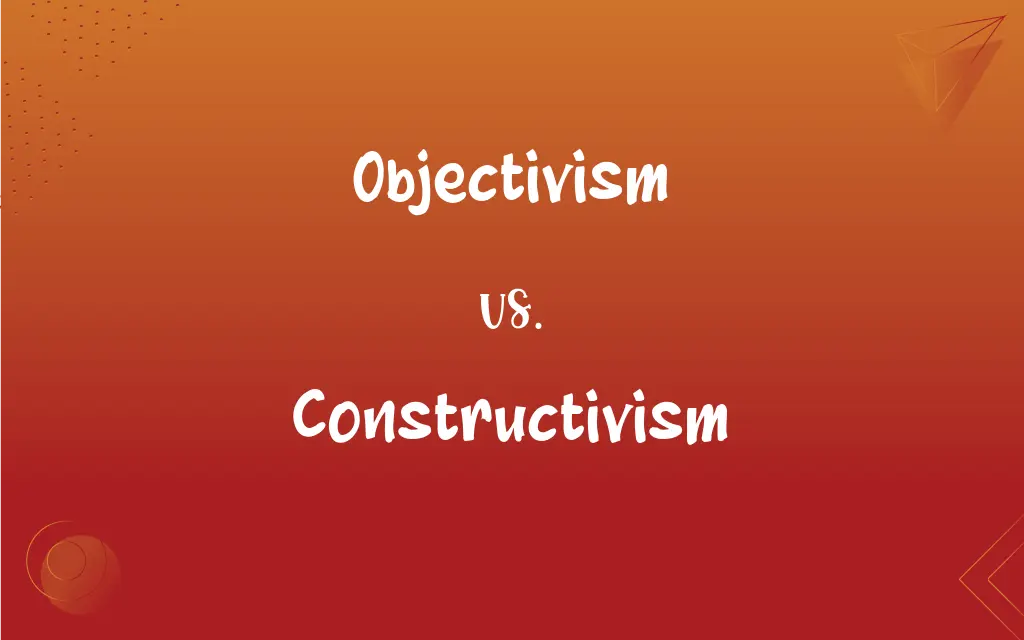Objectivism vs. Constructivism: What's the Difference?
By Harlon Moss & Janet White || Updated on May 30, 2024
Objectivism asserts that reality and truth exist independently of human perception, whereas constructivism posits that knowledge and understanding are constructed through human interaction and experience.

Key Differences
Objectivism is a philosophical stance asserting that reality exists independently of human thoughts, beliefs, and perceptions. It emphasizes an objective reality that can be understood through observation and rational analysis. Constructivism, in contrast, is a theory of knowledge and learning that suggests individuals construct their own understanding and knowledge of the world through experiences and interactions.
Objectivism champions the use of empirical evidence and logical reasoning to understand the world. It holds that there are objective standards for truth and morality that apply universally. In contrast, constructivism emphasizes the role of the learner in making sense of information, suggesting that meaning is created rather than discovered. Constructivists believe that reality is interpreted differently by each individual based on their experiences and background.
In education, objectivism supports traditional teaching methods focused on transmitting fixed knowledge from teacher to student. Constructivism, on the other hand, advocates for learner-centered approaches, where students actively engage in the learning process through exploration, questioning, and problem-solving.
Objectivism maintains that scientific knowledge is objective and value-free, while constructivism views scientific knowledge as influenced by human perspectives and social contexts. Thus, objectivists strive for objective facts, whereas constructivists emphasize understanding multiple viewpoints and the construction of meaning.
Comparison Chart
Core Belief
Reality and truth exist independently
Knowledge is constructed through experience
ADVERTISEMENT
Nature of Knowledge
Objective, universal, absolute
Subjective, contextual, relative
Learning Approach
Teacher-centered, transmission of fixed knowledge
Learner-centered, active construction of knowledge
Reality
Exists independently of human perception
Interpreted based on individual experiences
Scientific Knowledge
Objective and value-free
Influenced by human perspectives and social contexts
Objectivism and Constructivism Definitions
Objectivism
A philosophical stance asserting the existence of objective reality.
Objectivism claims that the laws of physics exist regardless of human perception.
ADVERTISEMENT
Constructivism
Belief that knowledge is shaped by cultural, social, and personal contexts.
Constructivism argues that historical interpretations are influenced by contemporary societal views.
Objectivism
Belief in universal truths discoverable through rational analysis.
Objectivism argues that mathematical truths are objective and not influenced by personal beliefs.
Constructivism
Theory of knowledge suggesting that understanding is constructed through experience.
Constructivism posits that children learn about the world through play and interaction.
Objectivism
Emphasis on empirical evidence and logical reasoning.
Objectivists rely on scientific methods to understand natural phenomena.
Constructivism
Emphasis on active learning and personal meaning-making.
Constructivist classrooms encourage students to explore and discuss to build their understanding.
Objectivism
Advocacy for objective standards in truth and morality.
Objectivism promotes the idea that moral principles are universal and not culturally relative.
Constructivism
Advocacy for learner-centered educational approaches.
Constructivist teaching methods include project-based learning and collaborative activities.
Objectivism
Focus on reality as independent of human thoughts and feelings.
Objectivism asserts that the Earth's round shape is a fact regardless of individual belief.
Constructivism
View of reality as interpreted based on individual experiences.
Constructivism holds that different cultures may perceive and describe natural phenomena differently.
Objectivism
(Philosophy) One of several doctrines holding that all reality is objective and external to the mind and that knowledge is reliably based on observed objects and events.
Constructivism
A movement in modern art originating in Moscow in 1920 and characterized by the use of industrial materials such as glass, sheet metal, and plastic to create nonrepresentational, often geometric objects.
Objectivism
An emphasis on objects rather than feelings or thoughts in literature or art.
Constructivism
(arts) A Russian movement in modern art characterized by the creation of nonrepresentational geometric objects using industrial materials.
Objectivism
Objectivism A school of modernist poetry emphasizing the poem itself as object, rather than focusing on its ostensible content.
Constructivism
(mathematics) A philosophy that asserts the need to construct a mathematical object to prove it exists.
Objectivism
The state of being objective; objectivity.
Constructivism
A psychological epistemology which argues that humans generate knowledge and meaning from their experiences.
Objectivism
Moral objectivism.
Constructivism
An abstractionist artistic movement in Russia after World War I; industrial materials were used to construct nonrepresentational objects
Objectivism
(philosophy) Any of several doctrines that holds that all of reality is objective and exists outside of the mind.
Objectivism
The specific objectivist philosophy created by novelist Ayn Rand, endorsing logical reasoning and self-interest.
FAQs
What is the educational approach of objectivism?
Objectivism supports traditional, teacher-centered methods focused on transmitting fixed knowledge.
Are scientific facts considered objective in objectivism?
Yes, objectivism maintains that scientific facts are objective and value-free, existing independently of human perception.
How does constructivism approach learning?
Constructivism advocates for learner-centered approaches, emphasizing active engagement and personal meaning-making.
What is the main belief of objectivism?
Objectivism asserts that reality and truth exist independently of human perception and can be understood through rational analysis.
Does constructivism believe in universal truths?
No, constructivism argues that knowledge and truth are subjective and relative, influenced by individual and cultural contexts.
Does constructivism influence scientific understanding?
Yes, constructivism posits that scientific understanding is influenced by human perspectives and social contexts.
Can knowledge be value-free according to constructivism?
No, constructivism argues that all knowledge is influenced by the values and perspectives of individuals and societies.
How does constructivism view knowledge?
Constructivism views knowledge as constructed through individual experiences and interactions, shaped by cultural and social contexts.
What does objectivism say about personal beliefs and reality?
Objectivism holds that reality exists independently of personal beliefs and perceptions.
How does constructivism view the role of the learner?
Constructivism sees the learner as an active participant in the learning process, constructing knowledge through experiences.
What is the focus of objectivist education?
The focus is on transmitting objective, established knowledge from teacher to student.
What role does empirical evidence play in objectivism?
Empirical evidence is crucial in objectivism, as it relies on observation and rational analysis to understand reality.
What is a key characteristic of constructivist classrooms?
Constructivist classrooms are characterized by activities that encourage exploration, discussion, and collaborative learning.
What is a practical example of objectivist teaching?
A lecture where a teacher presents established facts and principles is an example of objectivist teaching.
What is the ultimate goal of constructivist education?
The ultimate goal is to foster independent thinking and the ability to construct personal understanding through active engagement.
How does objectivism handle moral principles?
Objectivism believes in universal moral principles that apply universally, independent of individual beliefs.
How does constructivism handle multiple viewpoints?
Constructivism emphasizes understanding and integrating multiple viewpoints to construct meaning.
What is the main critique of objectivism by constructivists?
Constructivists critique objectivism for ignoring the subjective and contextual nature of knowledge.
Can constructivism be applied in real-world learning scenarios?
Yes, constructivism is often applied in real-world learning through experiential, project-based, and collaborative methods.
How might a constructivist approach a science lesson?
A constructivist might encourage students to conduct experiments and discuss their findings to build understanding collaboratively.
About Author
Written by
Harlon MossHarlon is a seasoned quality moderator and accomplished content writer for Difference Wiki. An alumnus of the prestigious University of California, he earned his degree in Computer Science. Leveraging his academic background, Harlon brings a meticulous and informed perspective to his work, ensuring content accuracy and excellence.
Co-written by
Janet WhiteJanet White has been an esteemed writer and blogger for Difference Wiki. Holding a Master's degree in Science and Medical Journalism from the prestigious Boston University, she has consistently demonstrated her expertise and passion for her field. When she's not immersed in her work, Janet relishes her time exercising, delving into a good book, and cherishing moments with friends and family.
































































